- Home
- Brian Keene
Take the Long Way Home Page 8
Take the Long Way Home Read online
Page 8
Immediately, I forgot about calling the authorities, and instead dialed home. The phone rang, and it was the sweetest sound I’ve ever heard.
“Yes! Come on, Terri. Pick up. Oh, pick it up.”
It rang again.
“Come on, sweetie, be home.”
A third ring. A fourth.
“Pick up, pick up, pick up . . .”
Five more rings.
“Answer the goddamn phone!”
It rang three more times before our answering machine finally picked up. I listened to my own voice telling me that Steve and Terri weren’t home right now and to leave a message at the beep.
“Terri, it’s me. I’m okay. If you’re there, pick up the phone! Something’s happened, and Craig is missing and people are dead, but I’m okay. Are you there? Terri? Pick up! Pi—”
The machine beeped again, indicating that it was done recording. A recorded voice told me that the mailbox was full.
“Goddamn it!”
I threw the cell phone across the room, and stalked back out to the front of the store. On my way out, I noticed a small, wooden plaque hanging on the wall, discreetly hidden from the view of customers. I studied it. It was some kind of poem, one I wasn’t familiar with, obviously of Christian origin. It was called ‘Footprints’ and was attributed to an unknown author.
One night, the poem began, a man had a dream. He dreamed he was walking along the beach with the Lord. Across the sky flashed scenes from his life. For each scene, he noticed two sets of footprints in the sand; one belonging to him, and the other to the Lord. When the last scene of his life flashed before him, he looked back at the footprints in the sand. He noticed that many times along the path of his life there was only one set of footprints. He also noticed that it happened at the very lowest and saddest times in his life. This really bothered him, and he questioned the Lord about it. “Lord, you said that once I decided to follow you, you’d walk with me all the way. But I have noticed that during the most troublesome times in my life, there is only one set of footprints. I don’t understand why, when I needed you most, you would leave me.” The Lord replied, “My son, my precious child, I love you and I would never leave you. During your times of trial and suffering, when you see only one set of footprints, it was then that I carried you.”
I repeated the last line out loud, and then I started shaking. My hands curled into fists. Enraged, I ripped the plaque from the wall and threw it across the store.
“Fuck you,” I shouted. “Are you walking with me now? Are you carrying me? Why did you do this to us? What’s the point? Were you really behind it? So this is the Rapture, huh? You called your followers home and left us sinners behind. Why? Because Charlie was gay? Because I’m a Jew? Because Frank didn’t believe in you anymore? Bastard!”
I waited for a divine lightning bolt to come down and strike me, but it didn’t. There was no thunder. The lights didn’t even flicker.
“I’ll walk my path alone,” I whispered, thinking of Gabriel.
It had gotten darker outside—which seemed impossible given what time of night it was. I walked out of the store, and looked around for Charlie, Skink or the mysterious Gabriel, but there was no sign of them. I hoped that Charlie was okay, that he’d gotten away or had enough sense to hide. Maybe he’d find some help, find the cop, and come back. Maybe not. It didn’t matter. He was my friend, but I couldn’t wait for him. Not anymore.
Craig was missing, along with several million other people. Hector and Frank were dead; Frank gunned down by skinheads and Hector with a pipe through his face. Charlie was gone, and Skink was still on the loose. And if all of this wasn’t enough, a weird black guy was following me up the highway, changing knives into snakes and skinheads into pillars of salt.
And Terri wasn’t answering the phone.
I headed north, sticking to the side of the road. I’d gone about a half-mile when I found Charlie. He was lying in a ditch. He’d been shot twice, in the stomach and the lower back. Despite his wounds, he was still alive. Nearby, in the driveway of a darkened house, stood another pillar of salt. Skink.
“Hey.” Charlie coughed, grimacing. “What took you so long?”
“Jesus Christ.” I knelt beside him, staring at the damage. “Don’t try to move, man.”
He grinned. “Couldn’t move if I wanted to. I can’t feel anything below my neck. Kind of glad for that, to be honest.”
He started to cry. I patted him.
“Oh Charlie…”
“Don’t worry. Like I said, I can’t feel a thing.”
“What happened?”
He stopped crying and coughed again. His chest rattled and black fluid leaked from the corners of his mouth.
“That fucker came after me. Figured I’d run this way and lose him, then double around back and check on you and Frank. How is he?”
I shook my head.
“Damn,” Charlie croaked. “He turned out to be an okay guy. I liked him.”
“Charlie, what happened to the skinhead? Did you see? Was it Gabriel?”
His eyes clouded. “Who?”
“Gabriel. The guy from the wreck. The one who caught me.”
Charlie smiled. If he heard my question, he gave no indication. Instead, he reached out and clasped my hand.
“Got a joke for you. A Jew, a Polack, and a homo are on their way home. Who gets there first?”
I squeezed his hand. “Charlie, don’t. Listen to me, man. I’m gonna get help.”
“Go find Terri, man. Get home.”
“I can’t just leave you here.”
“Bet I get home before you do.”
His chest rose then fell. It did not rise again.
I cried then, shuddering as huge, overwhelming sobs wracked my body. I leaned over and touched my forehead to my friend’s. I cried for Charlie and for Frank, for Hector and Craig and everybody else. I cried for Terri. I cried for myself.
I shuffled north again, still crying. I kept to the side of the road, walking through fields and yards rather than on the pavement itself. When I looked down, I realized I was trekking through mud. I glanced behind me.
There was one set of footprints in the mud. Mine.
I walked on, alone.
I continued up York Road for a few miles until the darkness and the silence got to be too much for me. By then, the fires from the plane crash had faded beyond the horizon. Eventually, I cut across the fields and back onto the interstate. There was a steep hill ahead of me, and my leg muscles cramped as I climbed it. Still I pressed forward, gritting my teeth and trying to ignore the pain. It wasn’t until I’d reached the top that I realized I was crying again. I wiped my nose on my sleeve, and blinked the tears away.
Another cramp shot up my leg, paralyzing it. Screaming, I collapsed to my knees in the middle of the road. Sharp pebbles jabbed through my pants and I reopened the cuts on my hand, but I didn’t care. I knelt there, my blood and tears flowing freely.
I didn’t notice the station wagon until it was right behind me. I looked up and shielded my eyes from the headlights’ glare. The motor purred softly. The vehicle rolled to a stop just a few feet away. I heard the whir of a power window being lowered.
“Are you okay, son?”
I stood up, wiped my eyes, and approached the driver’s side door.
A bald man, probably in his late fifties or early sixties, leaned out the window and smiled at me.
“Are you alright?” he asked again. “Do you need help?”
9
“I—I need a ride. I’m trying to get home to my wife.”
“Where do you live?”
“Shrewsbury. It’s the first exit in Pennsylvania.”
Smiling, he motioned the passenger door. “Certainly. I pass it every day. Hop in. I’m going as far as Harrisburg.”
I rounded the vehicle and opened the door. For a brief second, I had misgivings. After everything else I’d been through tonight, and some of the people I’d met, I wondered if it was smart to
climb in a car with a stranger. But the pain in my legs came back, and I thought again of Terri and my unanswered phone call. I got inside, pulled the door shut, and settled into the seat.
The man put the car in gear and pulled away. “Lucky for you I wasn’t speeding. I might have run right over you. What were you doing in the middle of the highway?”
I swallowed, trying to catch my breath. “It’s been a rough evening.”
“Yes.” He nodded, staring at the road. “It has indeed.”
I covered my mouth with my hand and coughed. My throat felt like it had been rubbed with sandpaper, but the pain in my legs was dissipating now that I was sitting down.
“Are you thirsty?” he asked, sipping from a plastic travel mug.
I nodded.
“There’s a small cooler behind you. I keep drinks in the car so I don’t have to stop. Saves me money and time. Help yourself. There should be some bottles of water inside, or soda if you prefer.”
“Thanks.” I turned and found the cooler, and got a bottle out. The water was ice cold and refreshing, and soothed my raw throat. “I really appreciate this.”
“My pleasure.” He stuck out his right hand. “Reverend Phillip Brady.”
“Steve Leiberman. Thanks again, Reverend. Can I offer you some gas money or something?”
“You can offer it, but I won’t accept. It’s really no problem. I’m going right by your exit. I volunteer in one of the soup kitchens down in Baltimore, and commute from Harrisburg. I come this way every day.”
I whistled in appreciation. “That’s a long drive.”
“It’s what the Lord wants.”
“What God wants, God gets?”
He frowned slightly. “That’s not quite how I’d put it, but I suppose so. It’s what God expects of me.”
I laughed, long and hard. The preacher looked shocked, and immediately, I felt embarrassed and worried that I’d offended him.
“Sorry, Reverend. I’m not laughing at you. It’s just, with all that’s happened today, all the disappearances, I was pretty much convinced that the Rapture had occurred. Seriously. If you could have seen some of the things I’ve seen tonight… I was really starting to get scared. But now, after meeting you, I know otherwise. It’s not the Rapture. Whatever it was that happened today, whatever took all those people, it wasn’t that.”
“Actually, I think it was the Rapture.”
“But you’re still here and you’re a man of God. Look, I’m Jewish and I don’t pretend to understand the whole thing, but my wife and her parents were Christian, too. I thought that when the Rapture occurred, all the Christians were called up to Heaven or something? That’s what my in-laws always said.”
“Not at all. In fact, I imagine that this Sunday the churches around the world will be filled to capacity. We’ll see more people in church than ever before.”
“But that doesn’t make sense.”
“Being a Christian isn’t enough. There are still plenty of believers who’ve been left behind. Just like myself.”
I shook my head. “I don’t understand.”
“How about a quick lesson?”
“Okay.” I glanced out the window and saw the exit for Gunpowder Falls flash past. Had I been on foot, it would have taken me another hour to reach it. Instead, it had taken five minutes. The last thing I wanted was a sermon, but I’d sit through one if it got me home to Terri sooner.
Reverend Brady took another sip from his travel mug. “‘For the Lord himself will come down from Heaven, with a loud command, with the voice of the archangel and with the trumpet call of God, and we who are still alive will be caught up together in the clouds to meet the Lord in the air. And so we will be with the Lord forever.’”
I didn’t respond. I wanted answers, not Bible quotes.
“Sorry,” the Reverend apologized, as if reading my mind. “That’s from Thessalonians. Talking about a great event. The Rapture is that event—God’s calling up millions of His believers to Heaven. It’s a prelude to the Second Coming of Christ, when Jesus comes back to rule over all. I’m sure that, like everyone else, you heard the trumpet blast that preceded today’s events?”
I nodded. “That’s really what it was?”
“In First Corinthians, the apostle Paul states that in the twinkling of an eye, the last trumpet will sound and the believers in Christ will be called home. That’s what happened today. Those who were born again, meaning they’d accepted Christ as their Lord and Savior, disappeared.”
“Where did they go?”
“Heaven.”
“But not you. And I saw others today, too: priests and nuns and people with those stupid Jesus-fish bumper stickers. We saw a guy preaching on the hood of his car, right in the middle of the interstate. If God took all of his followers home, why did He leave people like you behind? Aren’t you pissed off about it?”
“No, I’m not angry.” Reverend Brady smiled sadly. “But you’re absolutely right. I am still here. It’s my fault. And that breaks my heart, because I know what’s coming next. I know what the next seven years will bring.”
“I still don’t understand. If this is the Rapture, then why aren’t you among the missing?”
“Because I lacked belief. One of the most famous verses in the Bible is, ‘For God so loved the world, that He gave His only begotten Son; that whosever believes in Him shall not perish, but have eternal life.’ Jesus died for our sins, but in the last few years, I’ve lost touch with Him.”
“You didn’t believe?”
“No,” he whispered. “I didn’t. When you’re a pastor, whether you want to or not, you become the clearinghouse for your congregation’s gossip. Every single day, I’d overhear the worst—their darkest secrets, the things they didn’t think anybody else knew. I was exposed to their most base, animalistic natures. Adultery. Abuse. Sexual depravity. Drug addiction and alcoholism. Gambling. Theft and deception. One of our lay speakers embezzled over thirty-thousand dollars from his employer. Our church secretary poisoned her neighbor’s dog because it wouldn’t stop barking. Our youth pastor was engaging in a sexual relationship with his own fourteen-year old daughter.”
“And they told you all this?”
He shrugged. “Sometimes. Often I’d hear it from others. But sometimes they’d tell me themselves. Unlike the Catholic Church we don’t require confession, but they’d confess to me anyway, looking for guidance. Looking for somebody to assure them it was okay, that God still loved them. And I’d do that. I’d remind them that God forgives all, and they’d promise me they’d do right from now on—and then two months later they’d be right back at it again.”
He sighed. The radio played softly. In the soft glow of the dashboard lights, he looked older than I had assumed he was.
“I grew resentful. Not only of them, but of God, too. How was I supposed to be a shepherd, how could I guide them and teach them to live as the Lord wanted, when they filled me with such revulsion? I hated them for it and, eventually, I began to hate God as well. I was just going through the motions. But my congregation was still counting on me. Not all of them were bad people and I couldn’t let them down. So I stood up there in the pulpit every Sunday, and I preached the good news, told them about the Lord, and lent them the power of my belief. And all the while, deep down inside, I lacked the faith of my convictions. I didn’t believe.”
“And here you are,” I finished for him.
“Yes, indeed. Here I am. Left behind. God help me—help us all.”
“We’ll survive,” I said. “We’ll pick up the pieces, dust ourselves off and move on. We always do. Look at everything the human race has been through. We always bounce back.”
He shook his head. “Not this time. The next seven years will quite literally be hell on earth. War. Famine. Earthquakes. Disease. Total chaos.”
“Don’t we have that now?”
“No, Steve. This is just the beginning. We have those things now, but they pale in comparison to what’s coming. Th
is will be a tough time for the tribulation saints.”
I gasped.
“What’s wrong?” he asked.
“I—something you said just made me think. I heard something similar earlier today.”
“How so?”
I told him about all that had transpired. Even with the disappearances, I didn’t expect him to believe me when I got to Gabriel and the skinheads turning into salt. But when I’d finished, he simply nodded his head.
“You’ve been chosen.”
I snorted, trying to keep the sarcasm out of my voice. “Chosen for what?”
“Don’t scoff. A dynamic new leader is about to arise. People will see him as a great man. He will fix everything, stop the lawlessness and chaos and usher in an era of peace.”
“But you said it would be Hell on earth. Wars and famine and all that.”
“It’s a false peace, and he’s anything but a great man. The Bible calls this man Antichrist. He’s a descendent of those who destroyed the temple in Jerusalem in 70 A.D. But who he really is, is Satan. The Antichrist will enjoy worldwide popularity. People will love him like no other world leader they’ve ever known.”
“Who is he?”
“I don’t know. He has yet to reveal himself. But I’m sure he’s already active. We’ve probably watched him in action for years, and loved him without knowing his true identity. Soon, most likely within a few weeks, he will set up a new one-world government in response to today’s events. He’ll even bring peace to Israel with the signing of a seven-year agreement.”
“Never happen,” I said. “There will never be peace in Israel, especially now. And what does this have to do with me anyway? You said I was chosen.”
“The signing of the agreement kicks off a seven-year period called the tribulation, and those who receive Jesus as their Lord and Savior after the Rapture are called tribulation saints. Many of them will be Jews, just like you. Revelation talks about the 144,000 Jewish witnesses. These witnesses, the tribulation saints, will be protected supernaturally from the horrors to come. Much like you were today, with your guardian. What did you say his name was?”

 The Rising
The Rising Entombed
Entombed Take the Long Way Home
Take the Long Way Home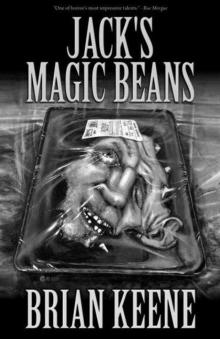 Jacks Magic Beans
Jacks Magic Beans Ghost Walk
Ghost Walk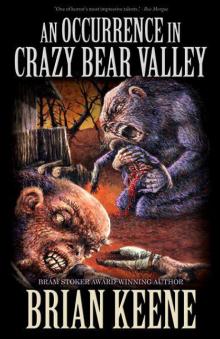 An Occurrence in Crazy Bear Valley
An Occurrence in Crazy Bear Valley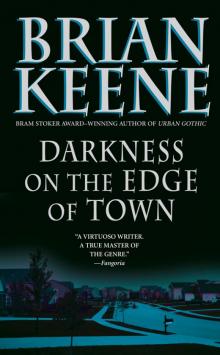 Darkness on the Edge of Town
Darkness on the Edge of Town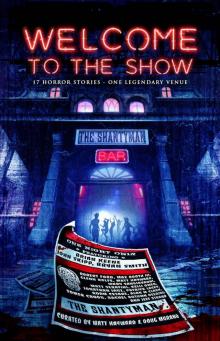 Welcome to the Show: 17 Horror Stories – One Legendary Venue
Welcome to the Show: 17 Horror Stories – One Legendary Venue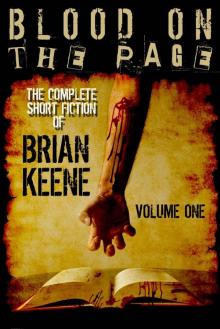 Blood on the Page: The Complete Short Fiction of Brian Keene, Volume 1
Blood on the Page: The Complete Short Fiction of Brian Keene, Volume 1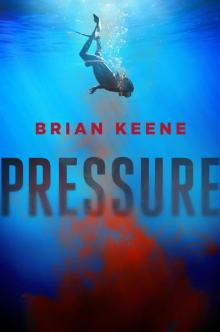 Pressure
Pressure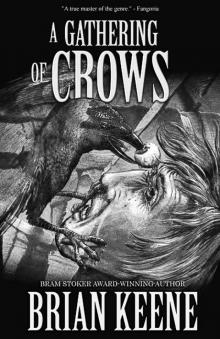 A Gathering of Crows
A Gathering of Crows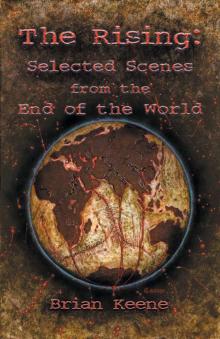 The Rising: Selected Scenes From the End of the World
The Rising: Selected Scenes From the End of the World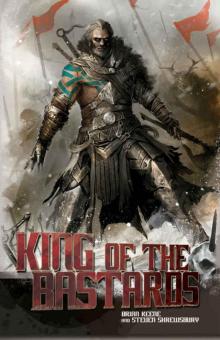 King of the Bastards
King of the Bastards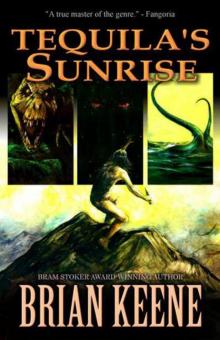 Tequila's Sunrise
Tequila's Sunrise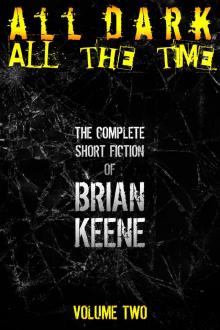 All Dark, All the Time
All Dark, All the Time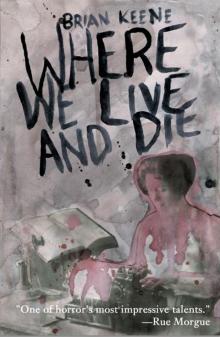 Where We Live and Die
Where We Live and Die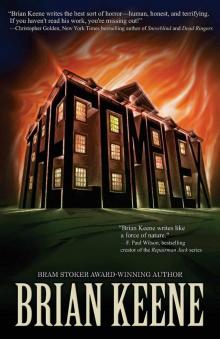 The Complex
The Complex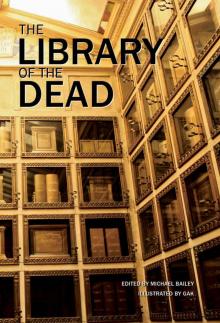 The Library of the Dead
The Library of the Dead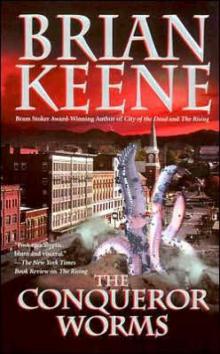 The Conqueror Worms
The Conqueror Worms The Girl on the Glider
The Girl on the Glider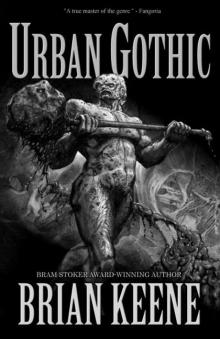 Urban Gothic
Urban Gothic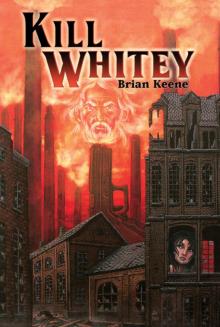 Kill Whitey
Kill Whitey Terminal
Terminal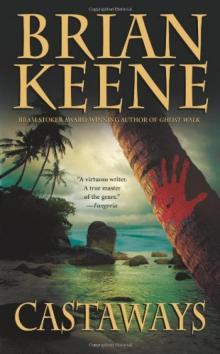 Castaways
Castaways